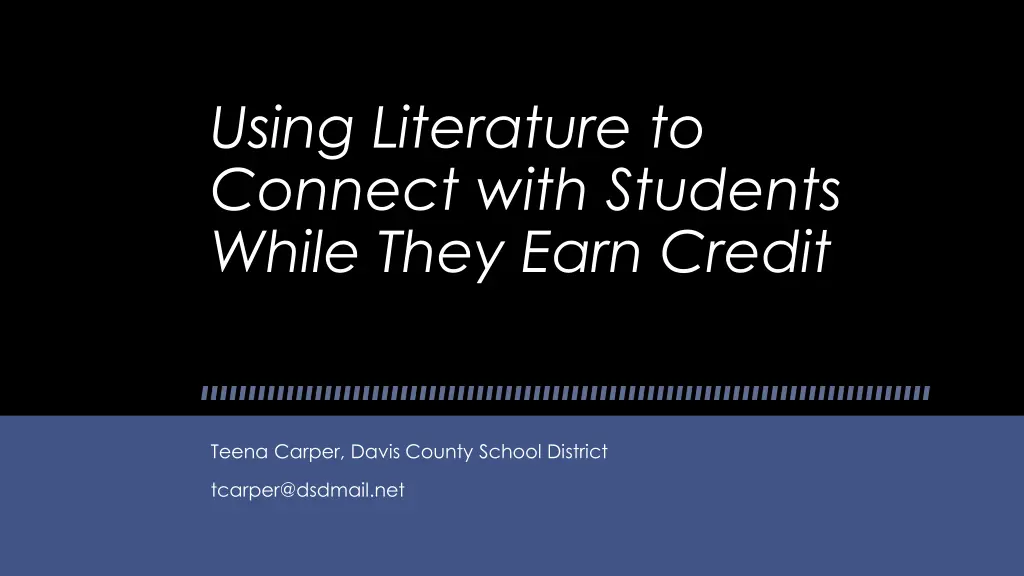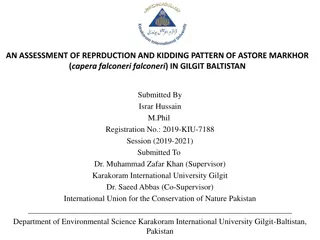
Connecting with Students Through Literature for Credit & Growth
Using literature to engage students earning credit, the presentation explores sources of resilience and self-help books as tools for personal development. Discover recommended books and insights on fostering connections with students through reading.
Download Presentation

Please find below an Image/Link to download the presentation.
The content on the website is provided AS IS for your information and personal use only. It may not be sold, licensed, or shared on other websites without obtaining consent from the author. If you encounter any issues during the download, it is possible that the publisher has removed the file from their server.
You are allowed to download the files provided on this website for personal or commercial use, subject to the condition that they are used lawfully. All files are the property of their respective owners.
The content on the website is provided AS IS for your information and personal use only. It may not be sold, licensed, or shared on other websites without obtaining consent from the author.
E N D
Presentation Transcript
Using Literature to Connect with Students While They Earn Credit Teena Carper, Davis County School District tcarper@dsdmail.net
Career Readiness Diploma What do we want for our adult learners? Lifelong Learner Confidence Fulfillment
CONNECTION is the key. Connecting with our students improve attendance and performance. Literature options give us insight to where they are coming from and to help them in where they want to go. Open enrollment presents challenges. We need something quick and ready to use.
Using great, research- based, self- help books can meet those needs of connection, credits and continued learning. What books do you recommend? Write your ideas on the poster board.
Focuses on four sources of resiliency. The book contains 27 resilience-building tools to help in your own life or organization. The Resiliency Break-Through by Christian Moore Questions are in the book ready for the students to answer and submit which is great for elective credit. I require students who are seeking Language Arts 12 credit to write a reflective essay.
What are the four sources of resiliency? Relational Resilience Street Resilience Resource Resilience Rock Bottom Resilience
Resiliency Break-Through student examples: "Selfishness is a powerful destroyer of relationships." (favorite quote from the book) "My electronic-device disorder score is an 8 which means it is out of control, and I need to put my device away for an extended amount of time and focus on other things." "I can use those negative remarks and statements as fuel to prove the person wrong and better myself." "I was asked to give a speech at a family member's wedding and thought I wouldn't be able to because of fear, but I flipped the switch, gave myself a pep talk and went on to give a memorable speech." "I need to communicate better in the workplace and in my relationship with family. I've decided to approach the higher-ups and supervisors with these questions as soon as the problem arises."
Reflective Essay on The Resiliency Break-Through Write a five-paragraph essay on what you have learned about yourself, your strength and weaknesses in the four categories of resilience and ways you are going to strengthen your resilience. The following is a suggestion of an outline for your essay: Introduction Paragraph- Introduce yourself and the topic of resilience and what that means to you. Body Paragraph 1- What did you learn about yourself especially when it comes to the topic of resilience? Make sure you include examples. Body Paragraph 2- What are your strengths and weaknesses in the four categories of resilience? Make sure you include examples. Body Paragraph 3- What are you going to change in your life to strengthen your resilience? Make sure you include specific commitments and goals. Conclusion Paragraph- Summarize where you have been and where you are going, and how your life will improve as you strengthen your resilience.
The Four Tendencies by Gretchen Rubin By asking the simple question, How do I respond to expectations? we gain explosive self-knowledge. People fit into Four Tendences: Upholders, Questioners, Obligers, and Rebels. Our tendency shapes every aspect of our behavior, so understanding this framework lets us make better decisions, meet deadlines, suffer less stress and burnout, and engage more effectively.
Take the paper quiz found at your table or take it https://quiz.gretchenrubin.com/four-tendencies-quiz/ online at https://quiz.gretchenrubin.com/four- tendencies-quiz/ https://quiz.gretchenrubin.com/four-tendencies-quiz/ Identify your one tendency- even if there is a tie, select one. You know yourself best. What is your tendency? This is NOT a personality structure. There are varieties of personality in each tendency. This is how you respond to inner expectations and outer expectations.
The Four Tendencies
To influence someone to follow a certain course, its helpful to remember: Upholders want to know what should be done. Questioners want justifications. Obligers need accountability. Rebels want freedom to do something their own way.
Were more likely to be persuasive when we invoke the values that have special appeal for a particular tendency. Upholders value self-command and performance. Questioners value justifications and purpose. Obligers value teamwork and duty. Rebels value freedom and self-identity.
The happiest and most successful people are those who have figured out ways to exploit their Tendency to their benefit and, just as important, found ways to counterbalance its limitations. For all of us, its possible to take the steps to create the life we want but we must do that in the way that s right for us. Gretchen Rubin, The Four Tendencies, p. 244
Workshop Take-Away Resources PDF's are available for download on the UAACCE site. You can take the extra handouts. Visit Website for Resources https://gretchenrubin.com/resources/
Essay Directions: REFLECTIVE ESSAY ON ___________________________________________ Write a five-paragraph essay on what you learned from the book and about yourself as you read this book. Include what you plan on doing to improve yourself. The following is a suggestion of an outline for your essay: Introduction Paragraph- Introduce yourself and the message from the book. Body Paragraph 1- What did you learn about yourself especially when it comes to the purpose of the book? Make sure you include examples. Body Paragraph 2- What are your strengths and weaknesses you have discovered while reading this book? Make sure you include examples. Body Paragraph 3- What are you going to change in your life to improve yourself, your circumstances or to help others? Make sure you include specific commitments and goals. Conclusion Paragraph- Summarize where you have been and where you are going, and how your life will improve as you meet your goals.
Generic Rubric Essay is at least _______ words._________ out of 10 points Essay used complete sentences._________ out of 10 points Essay includes detailed paragraphs._________ out of 10 points Essay is easy to read (legible). _________ out of 10 points Essay uses correct grammar_________ out of 5 points No spelling errors_________ out of 5 points Total:_________ out of 50 points
Contact Information: Teena Carper tcarper@dsdmail.net






















